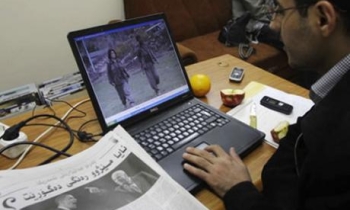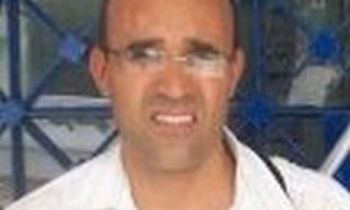The Moscow City Court trying three Chechens charged with murdering Paul Klebnikov has postponed the trial by a week even as the three accused pleaded not guilty when the trial began behind closed doors in Moscow, report agencies.
 SMILES OF ANOTHER DAY: The editor of Forbes magazine's Russian edition Paul Klebnikov speaks at a news conference to mark the edition of the Forbes magazine issue 'The Golden Hundred of the richest businessmen of Russia,' in Moscow, in this Thursday, May 13, 2004 file photo. Klebnikov, author of a book about tycoon Boris Berezovsky, was shot to death in July 2004 in Moscow, The alleged killers went on trial behind closed doors in the Moscow City Court on January 10. (AP Photo/Misha Japaridze)
SMILES OF ANOTHER DAY: The editor of Forbes magazine's Russian edition Paul Klebnikov speaks at a news conference to mark the edition of the Forbes magazine issue 'The Golden Hundred of the richest businessmen of Russia,' in Moscow, in this Thursday, May 13, 2004 file photo. Klebnikov, author of a book about tycoon Boris Berezovsky, was shot to death in July 2004 in Moscow, The alleged killers went on trial behind closed doors in the Moscow City Court on January 10. (AP Photo/Misha Japaridze)The court accused one of the defence lawyers of impeding the proceedings and then ordered a weeklong break. Ruslan Koblev, representing one of the three defendants, was accused by the Moscow City Court of a breach of ethics in the closed-door trial that began Tuesday, and referred him to the Moscow bar association, the Asociated Press said.
"The court has decided to inform the Moscow Chamber of Attorneys of the actions of a defence lawyer of Fail Sadretdinov, Ruslan Koblev, who the court believes is obstructing the trial process," said Larisa Maslennikov, the lawyer who is representing the Klebnikov family, according to RIA-Novosti report.
Paul Klebnikov, editor of Forbes magazine's Russian edition, was gunned down outside the magazine's Moscow office in July 2004 in one of the highest-profile killings in Russia. Prosecutors say the killing was ordered by Khozh-Akhmed Nukhayev, a former separatist minister in Russia's conflict-torn Chechnya, who was the subject of a book by Klebnikov titled Conversations with a Barbarian. Nukhayev remains at large.
Paul Klebnikov grew up in the United States but moved to Russia in 2004 to become editor of the Russian language version of Forbes. He believed that under President Vladimir Putin a new era of transparency was dawning in Russia and that the Russian Forbes would play an important role in that process. Klebnikov is one of 12 journalists murdered in contract-style killings since Putin took office in 2000. None of the murders has been solved, according to the Committee to Protect Journalists (CPJ).
"Not one of the accused pleaded guilty ... all declared their innocence of all charges," said defense lawyer Ruslan Khasanov, who represents Kazbek Dukuzov, who is charged together with Musa Vakhayev with the actual shooting death of Klebnikov. The third suspect, Fail Sadretdinov, faces charges of attempted murder and organising the group alleged to have killed Klebnikov.
Dukuzov and Vakhayev (both ethnic Chechens) were arrested in Belarus in November 2004 and extradited to Russia in February 2005. Sadretdinov (of Tatar origin) was arrested in Moscow in May 2005. In addition to Klebnikov's murder, the defendants are charged with attempting to kill Alexei Pichugin, a Moscow businessman from whom the trio allegedly tried to extort money.
 FIGHTING FOR JUSTICE: "We have considerable hope that all the people who earlier gave evidence in this case will show up and give evidence again in front of the court," said Larisa Maslennikov, the lawyer who is representing the Klebnikov family. The government has a 600-page case ? though defence lawyers showed reporters how chunks of the typewritten case were repeated ? and has suggested it might call around 150 witnesses. (ITAR-TASS/Yury Mashkov)
FIGHTING FOR JUSTICE: "We have considerable hope that all the people who earlier gave evidence in this case will show up and give evidence again in front of the court," said Larisa Maslennikov, the lawyer who is representing the Klebnikov family. The government has a 600-page case ? though defence lawyers showed reporters how chunks of the typewritten case were repeated ? and has suggested it might call around 150 witnesses. (ITAR-TASS/Yury Mashkov)Masennikova said Sadretdinov made an emotional outburst denying the allegations against him. "It is a very emotional atmosphere. They don't understand what they are accused of. They don't understand what is happening," Khasanov told reporters later.
Moscow City Court Press Secretary Anna Usachyova said that Koblev had from the beginning of the trial "systematically and crudely infringed the norms of the criminal-professional code, and also court orders." RIA-Novosti quoted her as saying, "The document to be sent to the Moscow Chamber of Attorneys will contain information on the need to take action against this lawyer."
After the hearing, Sadretdinov's lawyers, Moscow Times said, accused Judge Marina Komarova of manipulating the jury's perception of the case in order to please prosecutors. Komarova is known for meting out tough sentences in high-profile cases.
Koblev said Komarova forbade defense lawyers from disclosing any information about Pichugin. "The law prohibits disclosures about the lives of defendants in jury trials but says nothing about other participants of the process," he said. Another Sadretdinov lawyer, Pyotr Sursky, called into question Pichugin's signed testimony against the defendants, which he said had led investigators from the notary to the two Chechens.
The court ordered the trial closed to the public and the media, saying that some of the trial materials that will be seen by the 12-person jury (comprising 11 ethnic Russians and a Georgian / seven women and five men) are secret.
The government has a 600-page case – though defence lawyers showed reporters how chunks of the typewritten case were repeated – and has suggested it might call around 150 witnesses. "We have considerable hope that all the people who earlier gave evidence in this case will show up and give evidence again in front of the court," Maslennikova said earlier on Tuesday.
 WAITING TO BE UNMASKED: One of the accused being brought to court on Tuesday. Kazbek Dukuzov and Musa Vakhayev (both ethnic Chechens) were arrested in Belarus in November 2004 and extradited to Russia in February 2005. Fail Sadretdinov (of Tatar origin) was arrested in Moscow in May 2005. In addition to Klebnikov's murder, the defendants are charged with attempting to kill Alexei Pichugin, a Moscow businessman.(MosNews TV grab)
WAITING TO BE UNMASKED: One of the accused being brought to court on Tuesday. Kazbek Dukuzov and Musa Vakhayev (both ethnic Chechens) were arrested in Belarus in November 2004 and extradited to Russia in February 2005. Fail Sadretdinov (of Tatar origin) was arrested in Moscow in May 2005. In addition to Klebnikov's murder, the defendants are charged with attempting to kill Alexei Pichugin, a Moscow businessman.(MosNews TV grab)She said her role would be to closely follow the evidence presented. She refused to speculate on where that would lead, but noted "if at the end the prosecutors' version isn't confirmed, of course, we'll say that." She said that Klebnikov's brother, Michael, "believes in justice in Russia and is counting on common sense from the jury."
One of the last people to see Klebnikov alive, Alexander Gordeyev, the deputy editor of Russian Newsweek, denounced the trial as "a cover-up involving state officials". He said: "This should have been the most open case possible. The fact the court will be closed helps the real murderers."
Gordeyev said that the dying Klebnikov had told him that he was shot by a Russian, not by a Caucasian, and that he had twice given evidence of this to the prosecutor. "There's no logic for Paul to be killed for a previous story. I think it was something he was working on at that time which got him killed," he told the Times, London.
"Paul Khlebnikov did not mince his words," Reporters sans Frontières (RSF) said. "He was famous for his sensational revelations about links between the oligarchs and the Chechen warlords. The authorities should not ignore this aspect. The lack of transparency in the preparation of this case raises questions about the impartiality of the investigators and how serious their investigation really was. We also regret that the trial is being held behind closed doors."









